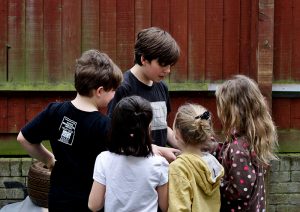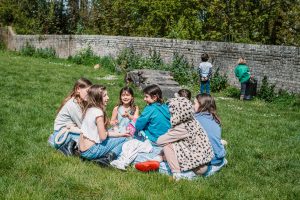Self-directed learning
The longest-lasting, most effective learning is actively pursued by the learner. Learning motivated by a genuine interest is fundamentally superior to externally motivated learning. Our students self-determine their own activities and goals and self-assess their progress. With no compulsory timetable or curriculum, students can self-pace their learning with no concept of ‘falling behind’.
Age-mixing
Students in Sudbury model settings benefit hugely from mixing with others of all ages, looking up to those ahead of them, observing and learning from them as role models, being spurred on by the challenges and skills they are yet to complete and gain. Age mixing encourages older students to be more creative and playful and to have compassion and consideration for those younger than them. It encourages younger students to take more responsibility, gain new skills, and learn from a diverse group of individuals at different stages in their life.
Time
In our setting, students have the time they need for their interests and pursuits. They have time to play, time to socialise, time to think, time to just be. Most importantly they have the time to learn how to learn. Having time allows children the space to problem-solve, decipher, practice and engage with the world around them and the skills they want to focus on. It allows them to delve deeper and practice until a skill or knowledge is satisfied. We believe that if a person knows how to effectively learn then they can go on to achieve all they wish to achieve. Our setting gives children the time to discover what they need to know in order to become lifelong learners.

Clubs
Community members with shared interests can form clubs to further their interest and organise their resources and activities. These ‘clubs’ need to be organised well in order to successfully run. Students of all ages can initiate or join clubs. Clubs organise themselves as they wish but if that group needs resources then they will have to put a case forward for funds to the Community Meeting or the relevant committee or they could raise the money through fundraising themselves. This is just one way in which reasoning, analytical, organisational and collaboration skills are acquired and honed.
Democratic organisation
The community is governed by the Community Meeting with each member having one equal-weight vote, empowering students to enact change and take responsibility for their community. Rule breaks and issues are handled by the mixed-age Judicial Committee and students can assist with the running of the community by taking up clerkships or getting involved with committee work such as helping with events, admissions, marketing, fundraising and more.
